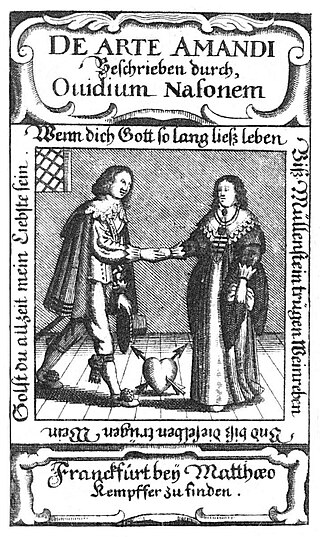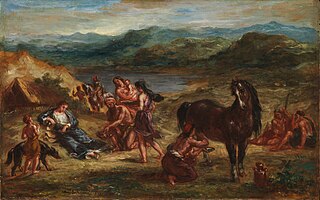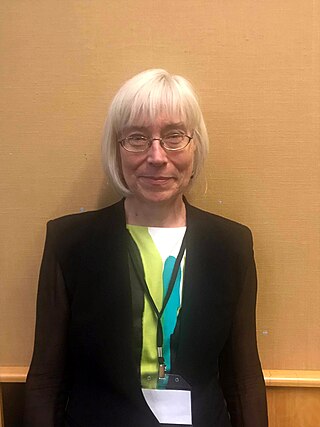Alison Sharrock | |
|---|---|
| Born | Alison Ruth Sharrock 4 January 1963 |
| Academic background | |
| Alma mater | University of Liverpool, University of Cambridge |
| Academic work | |
| Discipline | Classics |
| Institutions | University of Manchester |
Alison Ruth Sharrock (born 4 January 1963) is an English Classics scholar. She has been Professor of Classics at the University of Manchester since August 2000. [1] In 2009,she gave the Stanford Memorial Lectures. Together with David Konstan of Brown University,she edits the series Oxford Studies in Classical Literature and Gender Theory published by Oxford University Press. [2]
Alison Sharrock graduated in 1984 from the University of Liverpool with a Bachelor of Arts (BA) degree. [3] She received her doctorate (PhD) from the University of Cambridge in 1988. She worked at Keele University from 1989 to 2000. During her current post as Professor of Classics at the University of Manchester,she was Head of the Division of Archaeology,Religions and Theology,Classics and Ancient History (ARC),and then Head of the Department of Classics,Ancient History,Archeology and Egyptology (CAHAE) in the School of Arts,Languages and Cultures. She specialises in Latin literature,particularly in feminist readings of comedy,elegy and epic. [4] She also develops online support materials for teachers and learners of the Latin language. [5]
The elegiac couplet is a poetic form used by Greek lyric poets for a variety of themes usually of smaller scale than the epic. Roman poets, particularly Catullus, Propertius, Tibullus, and Ovid, adopted the same form in Latin many years later. As with the English heroic couplet, each pair of lines usually makes sense on its own, while forming part of a larger work.

Publius Ovidius Naso, known in English as Ovid, was a Roman poet who lived during the reign of Augustus. He was a younger contemporary of Virgil and Horace, with whom he is often ranked as one of the three canonical poets of Latin literature. The Imperial scholar Quintilian considered him the last of the Latin love elegists. Although Ovid enjoyed enormous popularity during his lifetime, the emperor Augustus exiled him to Tomis, the capital of the newly-organised province of Moesia, on the Black Sea, where he remained for the last nine or ten years of his life. Ovid himself attributed his banishment to a "poem and a mistake", but his reluctance to disclose specifics has resulted in much speculation among scholars.

The Metamorphoses is a Latin narrative poem from 8 CE by the Roman poet Ovid. It is considered his magnum opus. The poem chronicles the history of the world from its creation to the deification of Julius Caesar in a mythico-historical framework comprising over 250 myths, 15 books, and 11,995 lines.
Bulfinch's Mythology is a collection of tales from myth and legend rewritten for a general readership by the American Latinist and banker Thomas Bulfinch, published after his death in 1867. The work was a successful popularization of Greek mythology for English-speaking readers.

The Ars amatoria is an instructional elegy series in three books by the ancient Roman poet Ovid. It was written in 2 AD.

Amores is Ovid's first completed book of poetry, written in elegiac couplets. It was first published in 16 BC in five books, but Ovid, by his own account, later edited it down into the three-book edition that survives today. The book follows the popular model of the erotic elegy, as made famous by figures such as Tibullus or Propertius, but is often subversive and humorous with these tropes, exaggerating common motifs and devices to the point of absurdity.
Adrian Swayne Hollis was an English classical scholar and correspondence chess grandmaster, the title having been awarded in 1976.
Elaine Fantham was a British-Canadian classicist whose expertise lay particularly in Latin literature, especially comedy, epic poetry and rhetoric, and in the social history of Roman women. Much of her work was concerned with the intersection of literature and Greek and Roman history. She spoke fluent Italian, German and French and presented lectures and conference papers around the world—including in Germany, Italy, the Netherlands, Norway, Argentina, and Australia.
Don Paul Fowler was an English classicist.

Ovid, the Latin poet of the Roman Empire, was banished in 8 AD from Rome to Tomis by decree of the emperor Augustus. The reasons for his banishment are uncertain. Ovid's exile is related by the poet himself, and also in brief references to the event by Pliny the Elder and Statius. At the time, Tomis was a remote town on the edge of the civilized world; it was loosely under the authority of the Kingdom of Thrace, and was superficially Hellenized. According to Ovid, none of its citizens spoke Latin, which as an educated Roman, he found trying. Ovid wrote that the cause of his exile was carmen et error, probably the Ars Amatoria and a personal indiscretion or mistake. The council of the city of Rome revoked his exile in December 2017, some 2000 years after his banishment.
Judith P. Hallett is Professor and Distinguished Scholar-Teacher Emerita of Classics, having formerly been the Graduate Director at the Department of Classics, University of Maryland. Her research focuses on women, the family, and sexuality in ancient Greece and Rome, particularly in Latin literature. She is also an expert on classical education and reception in the nineteenth and twentieth centuries.
Rhiannon Ash is a British classical scholar specialising in Latin literature and Tacitus. She is professor of Roman Historiography in the Faculty of Classics, University of Oxford, and a Fellow of Merton College, Oxford. She was formerly a lecturer at the Department of Greek and Latin at University College, London.
Eleanor Winsor Leach was the Ruth N. Halls Professor with the Department of Classical Studies at Indiana University. She was a trustee of the Vergilian Society in 1978–83 and was second and then first vice-president in 1989–92. Leach was the president of the Society of Classical Studies in 2005/6, and the chair of her department (1978–1985). She was very involved with academics and younger scholars – directing 26 dissertations, wrote letters for 200 tenure and promotion cases, and refereed more than 100 books and 200 articles. Leach's research interests included Roman painting, Roman sculpture, and Cicero and Pliny's Letters. She published three books and more than 50 articles. Leach's work had an interdisciplinary focus, reading Latin texts against their social, political, and cultural context. From the 1980s onwards, she combined her work on ancient literature with the study of Roman painting, monuments, and topography.

Jennifer Ingleheart is a British classical scholar, who is known for her work on Ovid, Classical reception, and the influence of Rome on the modern understanding of homosexuality. She is Professor of Latin at the University of Durham.

Helen V. Lovatt is Professor of Classics at the University of Nottingham. She is known in particular for her work on Latin epic literature especially from the Flavian period.

Alison Keith is a classical scholar who is Professor of Classics and Women's Studies at the University of Toronto, where she has been a Fellow of Victoria University of Toronto since 1989. She is an expert on the relationships between gender and genre in Latin literature, and has published widely on topics including Latin epic poetry, Ovid, Propertius, and Roman dress.
Jacqueline Fabre-Serris is a French classical scholar, who is known for her work on Ovid, mythography, classical reception, and gender studies. She is Professeure des Universités of Latin Literature at the Charles de Gaulle University – Lille III.
Roy Gibson is a British Classicist and Professor at Durham University. Specialising in Latin Literature, he has worked extensively on the imperial period, with a focus on Ovid and Pliny the Younger. Gibson is also the joint-chair of the Classical Association and serves on the editorial board of the Journal of Roman Studies.

Arnulf of Orléans, also known as Arnulfus Rufus, was a grammarian and poet of Latin active as a teacher in Orléans in the late twelfth century. He had a famous rivalry with Matthew of Vendôme.
Kristina Milnor is Professor of Classics in the Department of Classics and Ancient Studies at Barnard College, Columbia University. She specialises in Latin literature, Roman history, feminist theory and gender studies.